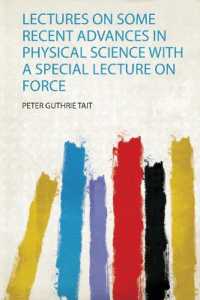Full Description
Castle Rackrent—Maria Edgeworth's first novel, and the work for which she was and is best known—occupies a most unusual place in the history both of Irish literature and of English-language fiction. It has sometimes been called the first historical novel in English literature, yet in its tone it more closely resembles a comedy of manners than anything in the genre that has come to be known as "the historical novel." It has been identified as the first of other lines as well—the first English novel written in a non-standard dialect, the first "provincial" or "regional" novel, and the first in what developed into the "big house" tradition of novels focused on the lives of the Anglo-Irish Protestant landholding class that dominated much of Ireland for centuries. Its innovative use of an unreliable narrator makes it also, arguably, an important milestone in the development of the novel form as a whole.
Castle Rackrent chronicles the declining fortunes and ultimate ruin of the Rackrent family through the mishandling of their estate by a series of incompetent and irresponsible heirs.
Edgeworth attested in a letter she wrote years later that "the only character drawn from the life" in the novel is Thady Quirk (servant to the Rackrent family, and the novel's narrator). But the novel as a whole is grounded in real events—the careless landlords and the "middle men who grind the face of the poor" described in Edgeworth's fiction were very real in eighteenth-century Ireland.
This edition does more than any other to set this classic novel in the political, economic, and religious context of eighteenth- and early nineteenth-century Irish life; in addition to an illuminating introduction, the edition includes a variety of background historical materials.
Contents
from Arthur Young, A Tour in Ireland, 1776-79 (1780)
The Rebellions of 1798 and 1803, and the Acts of Union
from Wolfe Tone, "An Argument on Behalf of the Catholics of Ireland" (1791)
from The Reading Mercury and Oxford Gazette, 23 July 1798
from "Examination of William James MacNeven before the Secret Committee of the House of Commons, Dublin," 7 and 8 August 1798
Songs of '98
Slievenamon (date unknown)
Carroll Malone, "The Croppy Boy" (1845)
from Francis Moylan, Letter to Thomas Pelham, 9 March 1799
from Report of a Motion Brought before the Irish House of Commons, as presented in The Aberdeen Journal, 10 March 1800
from Anne Devlin, The Life, Imprisonment, Suffering and Death of Anne Devlin (1851)
Letters to The Times Regarding Tithes
from Letter to The Times, 14 November 1804
from Letter to The Times, 24 November 1804
Maria Edgeworth on Castle Rackrent, and on the Irish
from Maria Edgeworth, Letter to Mrs. Stark (1834)
from Maria Edgeworth, An Essay on Irish Bulls (1803)
Reviews and Early Nineteenth Century Comments on Castle Rackrent
Unsigned Review, Monthly Review (1800)
Unsigned Review Notice, The British Critic (November 1800)
from anonymous, "Novels Descriptive of Irish Life," Edinburgh Review 52 (1831)
from "Miss Edgeworth's Tales and Novels," Fraser's Magazine for Town and Country 35 (November 1832)







